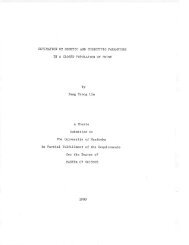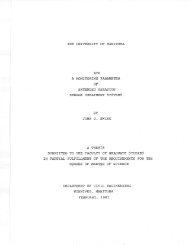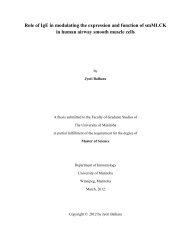Adverbial and Argument-Doubling Clauses in Cree - MSpace
Adverbial and Argument-Doubling Clauses in Cree - MSpace
Adverbial and Argument-Doubling Clauses in Cree - MSpace
Create successful ePaper yourself
Turn your PDF publications into a flip-book with our unique Google optimized e-Paper software.
argument <strong>in</strong> the matrk verbal complex forms a chah with the NP conta<strong>in</strong><strong>in</strong>g the A-<br />
doubl<strong>in</strong>g clause.<br />
(87) matrix verbal comdex<br />
[CP proi-v-proj I<br />
I<br />
Lj<br />
I<br />
A-doubl<strong>in</strong>a clause<br />
[CP prq-v 1 1<br />
I have already demonstrated, <strong>in</strong> section 3.3.3.1, examples (40 <strong>and</strong> 41), that the verbal<br />
rnorphology of a matrix verb is identicai whether it occurs with an A-doubl<strong>in</strong>g NP or<br />
clause. If we daim that A-doubl<strong>in</strong>g clauses are situated <strong>in</strong>side a conta<strong>in</strong><strong>in</strong>g NP, the<br />
identical agreement rnorphology is not surpris<strong>in</strong>g. The pronom<strong>in</strong>al argument is always<br />
doubled by an NP. This analysis receives support fiom a treatment that has been<br />
proposed by Re<strong>in</strong>holtz <strong>and</strong> Russell ( 1995) for Wh-questions, which we discussed<br />
previously <strong>in</strong> section 3.3.3.1.3, <strong>and</strong> review aga<strong>in</strong> <strong>in</strong> the next section.<br />
5.4.1 Evidence from W hQuestions<br />
In the treatment of Wh-questions, there is a clear case to be made for relativization be<strong>in</strong>g<br />
<strong>in</strong>volved. Wh-questions consist of an <strong>in</strong>itial wh-phrase <strong>and</strong> a conjunct verb. Independent<br />
fonns of the verb are disailowed, which shows us that the clause is subord<strong>in</strong>ate. To<br />
demonstrate this subord<strong>in</strong>ate status, we will look aga<strong>in</strong> at example (36) fiom section 3.3.3,<br />
renumbered here as (88). (88b) <strong>in</strong> this example shows that a verb <strong>in</strong> the <strong>in</strong>dependent<br />
order, <strong>in</strong> common <strong>in</strong> matrk, declarative clauses, is ungrammatical <strong>in</strong> a Wh-question.<br />
(88) a. ch kiskênimêw awêna kii-sipwêhtêait.<br />
John know.TA-(33') who cj-leave.AI-3'<br />
'John knows who lefi.'



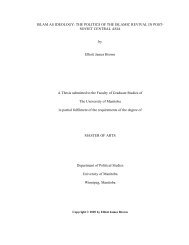
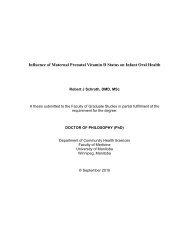
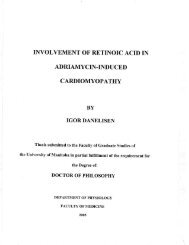
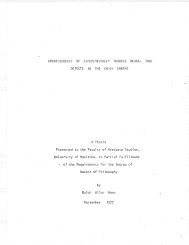
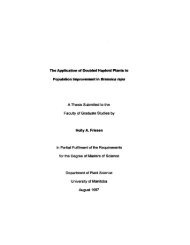
![an unusual bacterial isolate from in partial fulf]lment for the ... - MSpace](https://img.yumpu.com/21942008/1/190x245/an-unusual-bacterial-isolate-from-in-partial-fulflment-for-the-mspace.jpg?quality=85)
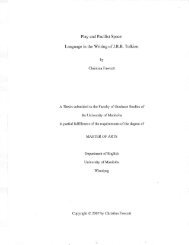
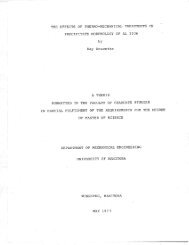
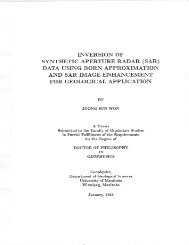
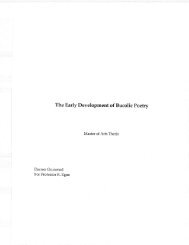
![in partial fulfil]ment of the - MSpace - University of Manitoba](https://img.yumpu.com/21941988/1/190x245/in-partial-fulfilment-of-the-mspace-university-of-manitoba.jpg?quality=85)
